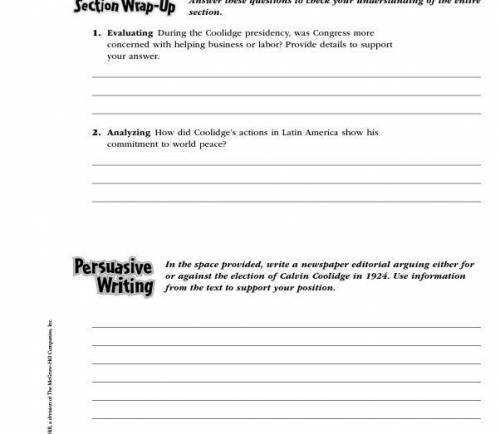Chapter 10, Section 2 (Pages 308-311)
Desire for Normalcy
Read the passage below then do the...

Chapter 10, Section 2 (Pages 308-311)
Desire for Normalcy
Read the passage below then do the worksheet.
Warren G. Harding and Calvin Coolidge were the Republican candidates for president and vice president in 1920. They promised a return to “normalcy” and won the election eas-ily. After the election, Harding appointed several skilled people to his cabinet. However, he also gave some government jobs to political supporters who were not qualified. Some of these offi-cials were dishonest. The biggest scandal during the Harding presidency involved Albert Fall, the secretary of the interior. He secretly leased, or rented, oil reserves owned by the government to two oil compa-nies. In exchange, he was paid more than $400,000. Fall was convicted of bribery and went to prison. Because one of the oil reserves was in Teapot Dome, Wyoming, the scandal became known as Teapot Dome. Harding died in 1923, and Calvin Coolidge was sworn in as president. Coolidge was known for his honesty. After he took office, Coolidge allowed the investigations into the Harding scandals to continue. Coolidge also replaced est officials with honest ones. Harding and Coolidge had similar beliefs about how the gov-ernment should be run. Both thought that government should not interfere in the life of the nation. This is known as a laissez-faire approach to government. During the Coolidge presidency, Congress passed laws to sup-port business. It lowered tax rates for corporations and wealthy Americans. It raised tariffs on imported goods to protect American businesses. Laws that regulated child labor and women’s wages were overturned. Coolidge’s policies were popular. He won the 4 presidential election with 54 percent of the popular vote. Harding and Coolidge believed that the United States should be involved in world affairs as little as possible. This policy is called isolationism. The policy of isolationism kept the United States out of the League of Nations. However, Harding and Coolidge still worked for world peace. In 1922 the United States joined Japan, Britain, France, and Italy in signing the Five-Power Treaty. This treaty limited the size of these nations’ navies. In 1928 the United States was one of 15 nations that signed the Kellogg-Briand Pact. This pact called for outlawing war. Coolidge also reduced the number of U. S. troops in Latin America. American troops had been stationed in the Dominican Republic and Nicaragua since the early 1900s to protect American business interests there. After elections were held in these two countries in the 1920s, the United States withdrew its troops. Coolidge decided not to send troops to Mexico when the Mexican government threatened to take over foreign-owned oil and mining companies. Instead, Coolidge chose to negotiate.


Answers: 3


Another question on History

History, 21.06.2019 13:30
Iwant to be an engineer but cant do math for the life of me, but i also want to be a cop. "what should i do"
Answers: 1

History, 21.06.2019 20:30
What was the result on the u.s. economy because of the major changes in atlantic shipping prior to and during the war of 1812?
Answers: 1

History, 22.06.2019 01:30
Which of these is a role of congress? a) to veto legislation b) to pass the federal budget c) to nominate cabinet members d) to interpret the constitution 2) which of these is a power of the legislative branch? a) declare war b) enforces laws c) interprets laws d) negotiates treaties 3) a two/thirds vote of each house of congress is required to a) impeach the u.s. president. b) approve presidential appointments. c) pass an appropriation or tax bill. d) pass a bill over the president's veto. 4) the chief purpose of congressional committees is to a) draft legislation for consideration by the full congress. b) act as a group to which the president can direct his lobbying effort. c) provide a place for lobbyists and special interest groups to get support. d) hold hearings so that bills can be evaluated and studied prior to voting. 5) after a bill has been passed by both houses of congress it a) becomes a law. b) is sent to the president. c) returns to the house of origin for verification. d) is sent to a subcommittee in the house or senate. 6) house of representatives passes a spending bill → senate debates the spending bill → senate passes the spending bill → ? what completes this sequence of events? a) the spending bill becomes a law b) the states must approve the bill c) the supreme court reviews the bill d) the president must act on the bill eliminate
Answers: 1

History, 22.06.2019 02:20
What crime was king louis xvi accused of, what happened to him as a result?
Answers: 1
You know the right answer?
Questions

Computers and Technology, 19.05.2021 21:40





English, 19.05.2021 21:40



Chemistry, 19.05.2021 21:40





History, 19.05.2021 21:40


Mathematics, 19.05.2021 21:40



English, 19.05.2021 21:40



